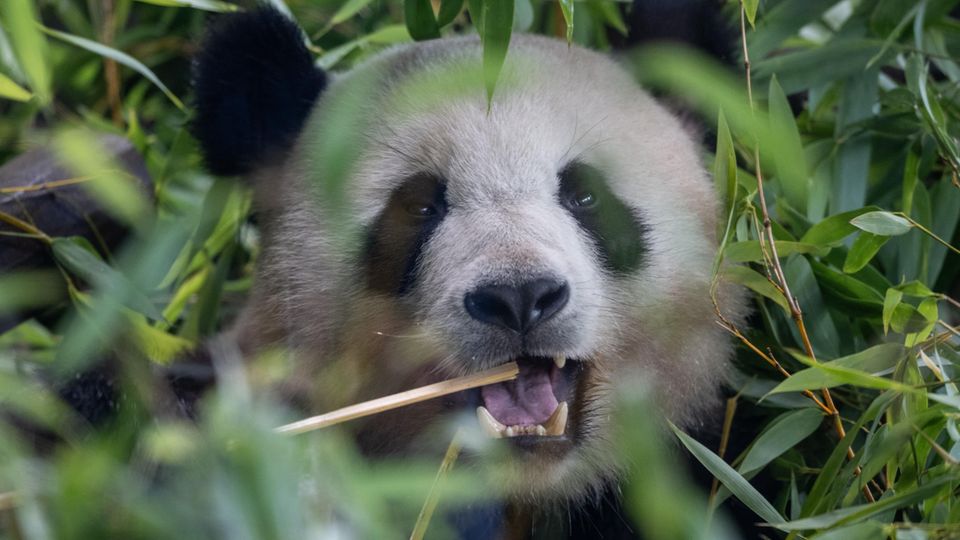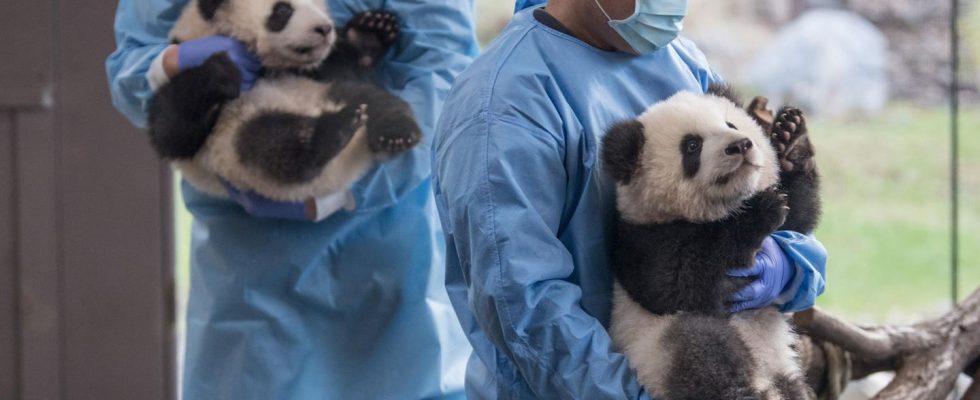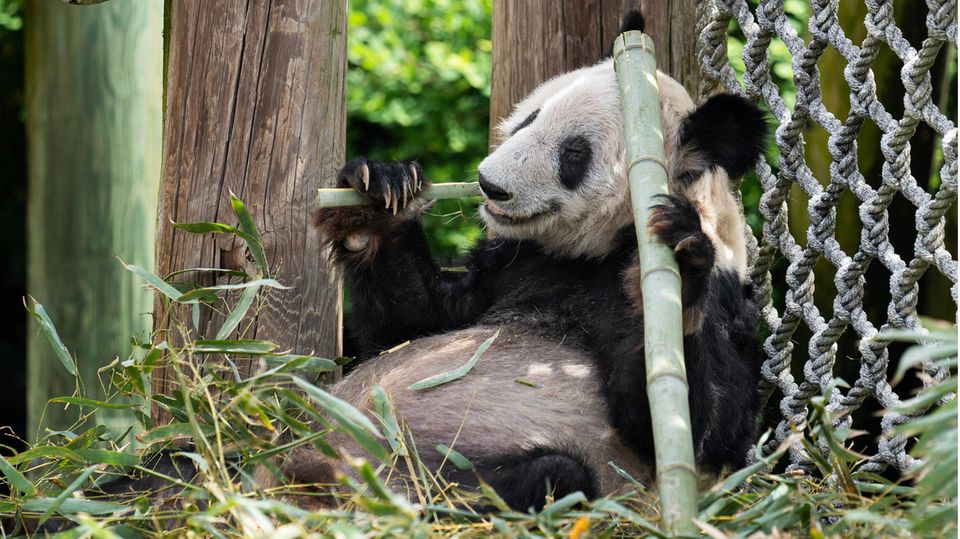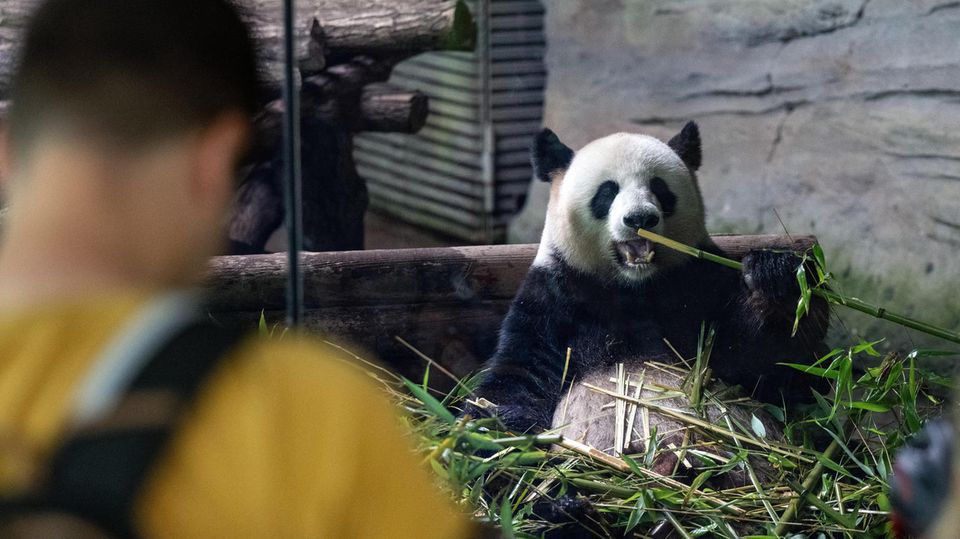Berlin Zoo
Cuddly, sweet, expensive: Pandas Pit and Paule are turning four
In January 2023, Pit and Paule were seen for the first time by visitors to the Berlin Zoo
© Jörg Carstensen / DPA
The pandas Pit and Paule are among the favorites at the Berlin Zoo. They will soon be celebrating their fourth birthday. They should actually be in China long ago. How are things going with them?
The delight in front of the enclosure of the panda twins Pit and Paule is great. On a day in early August, children cheer for joy, visitors happily put their hands in front of their faces and eagerly take photos while they are crowded in front of the glass pane. The two pandas don’t seem too impressed by the hype surrounding them: one eats bamboo incessantly, the other hangs in a somewhat uncomfortable-looking position with its front legs over a wooden beam and sleeps. This has recently become his favorite position, says zoo keeper Marvin Dufke.
Though they’re now portly teenagers compared to human years, Pit and Paule continue to excite Panda fans. On August 31st they celebrate their fourth birthday at the zoo. The animals should actually no longer be in Berlin, but should have moved to the breeding and research station in Chengdu, China. This is what the contract with the Chinese business partners provides. Not only the adult animals, but also the offspring born abroad belong China.
The corona pandemic with its travel restrictions is to blame for the delay, explains zoo director Andreas Knieriem. As a result, a kind of “traffic jam” has arisen in the worldwide repatriation of panda cubs. The departure of the Panda brothers has been delayed indefinitely. “We hope that this will happen in the next twelve months,” says Knieriem.
Pit and Paule are the only pandas in Germany
Giant pandas are not only considered cute, they are also extremely rare. A little over 1,800 giant pandas lived in the wild in China in 2015 – the year with the last confirmed census, according to the World Wide Fund For Nature (WWF). In 2019 there were 600 in zoos worldwide. Since the animals are very reluctant to have sex and the females are only fertile three days a year, reproduction in the wild is difficult. The fact that Pit and Paule’s parents Meng Meng and Jiao Qing successfully mated in 2019 was a small sensation and an important symbol for species protection. The four bears are the only ones of their kind in Germany.
“We even surpassed Knut’s visitor numbers,” says Knieriem. The birth of the polar bear cub Knut brought almost 3.2 million visitors to the zoo in 2007 (2006: around 2.5). In the year Pit and Paule were born (2019) there were around 3.7 million visitors, in 2022 around 3.6 million.

Pit and Paule cost the Berlin Zoo a lot of money, especially the bamboo is very expensive
© Hannes P. Albert / DPA
Twice a day there is commented feeding of the pandas, in the zoo shop the black and white dominates with panda socks, panda cuddly toys and panda USB sticks. According to Knieriem, even the facility – the so-called Panda Garden – was strategically built in such a way that it can be reached quickly from the zoo entrance. But the zoo also spends a lot of money on keeping the panda bears, not least on the food. “The bamboo costs a lot of money,” says Knieriem.
Added to this are the costs for the so-called compensation contribution that Zoo China pays for the four animals. According to the annual report, the Chinese receive around one million US dollars a year. Knieriem does not want to comment on the numbers and does not provide any information on the cubs either, but says that the costs are 70 percent for panda species protection projects, 20 percent for research in Chengdu and 10 percent for the Chinese administration.
Berlin Zoo received pandas as a sign of friendship
The Middle Kingdom leaves the bears from its own breeding only to selected countries. This is also called panda diplomacy. Critics say China uses panda bears as a reward for countries with which it signs trade deals, according to Sarah Eaton, a professor of transregional China studies at Humboldt University. Pandas have never been the determining factor in bilateral relations between China and other countries, but they serve as a powerful symbol of goodwill and friendship, Eaton says.
Pit and Paule are the crowd favorites at the Berlin Zoo
According to Knieriem, the political deal with the pandas does not play a role – and even if: “As long as it runs according to democratic rules, we support everything in politics that is good for nature conservation.” Even if it’s an expensive affair, he spends money “with a clear conscience” on the preservation of the pandas. According to the zoo, it is financed by entrance fees and donations and bears the costs for the pandas alone.
Even after Pit and Paule’s move out, cute residents should be taken care of: “We’re planning to have children again,” assures the director. But first we have to celebrate: for the twins’ four-year birthday, there will be special promotions for visitors – and a panda-friendly cake for Pit and Paule.



